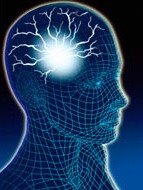Don't Try This At Home: Working Memory and Convulsions
 Febrile convulsions are a fairly common effect of childhood fever: by some estimates, 1 in 20 children will experience a fever-induced seizure, with this likelihood increasing significantly if one or both parents have a history of febrile convulsions. It would be easy to dismiss febrile convulsions as merely a secondary disease, if it weren't for one fascinating fact: children with a history of febrile convulsions (FC) have in some cases been reported to do better in school than their healthy peers.
Febrile convulsions are a fairly common effect of childhood fever: by some estimates, 1 in 20 children will experience a fever-induced seizure, with this likelihood increasing significantly if one or both parents have a history of febrile convulsions. It would be easy to dismiss febrile convulsions as merely a secondary disease, if it weren't for one fascinating fact: children with a history of febrile convulsions (FC) have in some cases been reported to do better in school than their healthy peers.Following up on work that showed a scholastic advantage for children with FC, Chang et al. interviewed over 4,300 Taiwanese families to identify 103 children with FC. These children were then brought into the lab for testing on a variety of memory and learning tasks. For comparison, an age- and sex-matched control group of 213 healthy children was selected from the Taiwanese school districts and run on the same tasks. There were no significant differences in parental socio-economic status between the two groups, and yet the two groups showed remarkable differences on several cognitive tests.
The group with a history of febrile convulsions performed significantly better on three tests of spatial memory than the control group. Only in terms of the number of errors on a "sequential learning" task did the FC group do significantly worse than controls; in all other cases the FC group did just as well - or significantly better.
These findings are compatible with those published previously by the same authors, showing that children with a history of FC perform better on a measure of scholastic aptitude. Because the actual tasks used in this specific study are unconventional, and are not adequately explained in the paper, it's hard to know exactly what cognitive functions may be improved in FC (although the authors claim their task that dissociates mneumonic capacity from executive functions, I don't buy it). One message is clear, however; children with a history of febrile convulsions can show a cognitive advantage over their peers.
Why should a symptom of severe illness - full-body seizures - be related to these kinds of cognitive advantages? No one knows for sure, but one possibility raised by the authors is that those who experience FC have a slightly higher prevalence of NMDA receptors, possibly in the hippocampus. According to their logic, this may result in a lower seizure threshold, but under normal circumstances could result in improved LTP or spatial learning.
This study should be taken with a grain of salt - many of the tasks used are unconventional, and this subject matter is unusual for the journal in which the study was published (although Neurology is a high-impact peer-reviewed journal). Some previous studies have not found an ycognitive advantage among children with FC, but that may be due to their use of hospital populations, who tend to show a higher incidence of comorbidity, in particular with mental retardation. On the other hand, this case study may provide a window onto one of the brain's many delicate balancing acts: how to maintain sensitivity and yet avoid hyper-excitability (such as might lead to convulsions).
Related Posts:
Smarter than the Average Primate: How Children and Chimps Sometimes Outperform Human Adults
Neural Oscillations and the Mozart Effect: Does Classical Music Really Improve IQ?
Video Games - Mental Exercise or Merely Brain Candy?
Enhancing Memory With Visual Flicker: Peripheral visual stimulation can enhance recognition memory


11 Comments:
very nice!
keep up the good work!
Thanks guys! Glad you're enjoying it. If you like this one, I think you'll like tomorrow's post :)
Pretty intense Chris!
Great research / post!
.
Check out my AWESOME blog:
ohpunk.blogspot.com
Good stuff. Hope I'll find time to
read it some more. See you.
Very nice, great work keep it up. Dont stop writing we doing very fine job.God bless you and your family.
Hi Pie - You're absolutely correct, it's possible that there's a "third variable" that influences or is influenced by both febrile convulsions and learning/memory functions. But the way I look at it, lowering the seizure threshold may in some cases have the side effect of improving learning, as it appears to in this case. But in order to establish this chain of causality definitively, we'd need a real experiment, not merely a correlational study like the one here: we'd actually have to test kids learning & memory before and after a febrile convulsion. This would be very difficult to do, needless to say...
I also know that seizures can be associated with attention or rather lack of it, and anger management, or rather lack of it. I have two friends who take an anti-seizure medicine and it is related to seizures and behaviours...anti-social behaviours in particular.
HAVE YOU EXPERIMENTED WITH LUCID DREAMING?
I hear excess ACh causes seizures, that's how nerve gases work? ACh also seems to be an "attention neurotransmitter", right?
Hey Boris - No one is really sure exactly what ACH does or how it does it. Some theories suggest that it's released under conditions of "expected uncertainty" whereas adrenaline is released under conditions of "unexpected uncertainty." The proof for these views is somewhat thin.
A different theory suggests there's a role for acetylcholine in improving the cortical signal to noise ratio, which can be seen as "inhibition" in the way the term is commonly used.
But no one really knows yet...
Post a Comment
<< Home